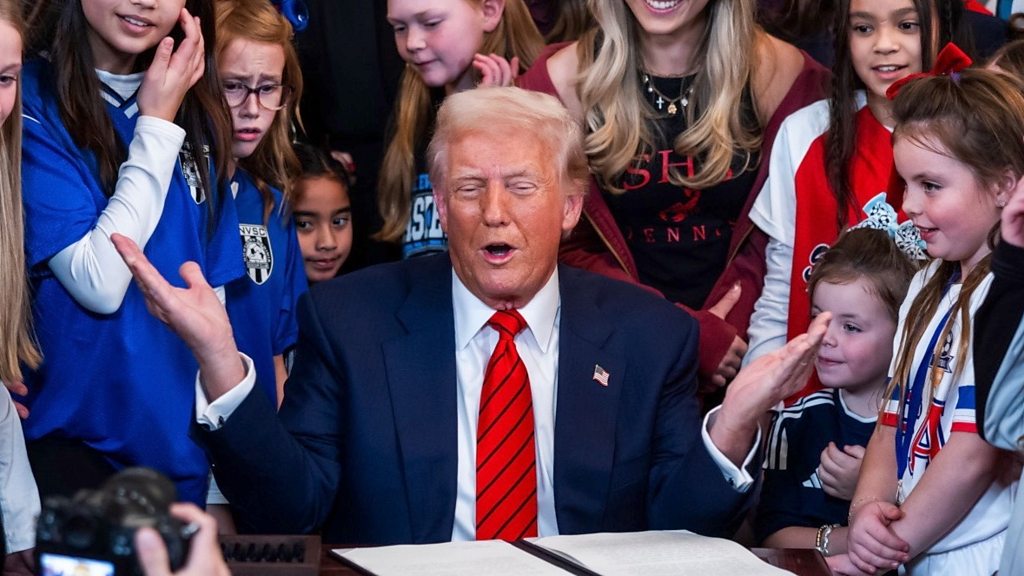
The Trump administration has taken a significant step in its ongoing efforts to curb the participation of transgender women in women’s sports by freezing $175 million in federal funding to the University of Pennsylvania (UPenn). This funding freeze stems from UPenn’s policies that allow transgender women to compete on women’s sports teams, most notably in the case of Lia Thomas, a transgender swimmer who gained national attention for competing on the university’s women’s swimming team.
The decision was announced through a post on X, formerly known as Twitter, by the Trump White House’s rapid response communications team. The post shared a report from Fox Business about the funding freeze, with the team echoing the President's campaign slogan, saying, "Promises made, promises kept."
This phrase, which was central to Trump’s 2016 election campaign, signals his administration’s commitment to fulfill his pledges from the campaign trail, including taking action against what he and his supporters view as an unfair advantage for transgender women in competitive women’s sports.
The freeze comes amid heightened scrutiny of policies allowing transgender athletes to compete in women’s sports, a subject that has become a key issue for conservatives. Trump himself made it clear during his election campaign that he would take action to stop trans women from participating in women’s sports, citing concerns about the potential physical advantage some trans women might have due to biological differences.
He argued that the presence of trans women in women’s sports creates an uneven playing field, and that their participation poses a potential danger to cisgender women in these competitions.
A spokesperson for UPenn responded to the reports of the funding freeze, stating that the university was aware of the situation but had not yet received official notification or further details. "It is important to note, however, that Penn has always followed NCAA and Ivy League policies regarding student participation on athletic teams," the spokesperson stated, emphasizing that the university had been in full compliance with the regulations set forth by both the NCAA and the Ivy League, which govern collegiate athletics in the U.S.

Despite this, Trump’s administration has followed through with its promise to freeze the funds. The funding freeze is not without controversy, especially since it impacts discretionary funding from federal agencies like the Department of Defense (DOD) and the Department of Health and Human Services (HHS).
A senior administration official described this move as "just a taste" of what might come next, suggesting that UPenn could face further sanctions, including the loss of all its federal funding. This action appears to be connected to ongoing Title IX investigations into the university’s handling of transgender athletes, including the controversial case of Lia Thomas, who was allowed to compete on the women’s team and use women’s facilities like locker rooms.
Title IX, the landmark 1972 law that prohibits discrimination based on sex in educational programs and activities, including sports, is at the heart of the controversy. Trump’s administration has argued that allowing trans women to compete in women’s sports violates the spirit of Title IX, which was designed to create equal opportunities for women and girls in sports.
According to Trump’s stance, trans women’s participation in women’s athletics undermines this goal and is harmful to cisgender women athletes, who may not have the same physical advantages.
Fox Business reported that the freeze on federal funds could have far-reaching consequences for UPenn. Federal funding is critical to the university, supporting a wide range of academic programs, research initiatives, and student services.
If the university cannot resolve the issue, it may face severe financial implications that could affect its ability to carry out essential functions.
The freeze on UPenn’s funding is a continuation of a broader pattern of actions taken by the Trump administration to challenge policies that it deems to be supportive of transgender rights in ways that are seen as detrimental to cisgender women. This includes Trump’s executive order signed on February 5, 2025, titled “Keeping Men Out of Women’s Sports,” which explicitly states that the administration’s goal is to rescind federal funding from educational institutions that allow transgender athletes to compete in women’s sports.

The executive order highlights the perceived dangers of allowing men, or trans women, to compete in women’s sports, claiming that this is “demeaning, unfair, and dangerous” to women and girls. The order further states that the administration will oppose male competitive participation in women’s sports to ensure fairness, safety, and dignity for female athletes.
The Trump administration’s legal strategy includes the use of Title IX to enforce its policy, arguing that trans women’s participation in women’s sports violates the equal opportunity rights of cisgender women and girls.
In response, advocates for transgender rights and equality argue that such measures are discriminatory. They believe that transgender women should have the same rights as any other women to participate in competitive sports, and that their inclusion is essential for fairness and inclusivity.
Legal challenges are likely to arise from advocates for trans women, who will argue that the Trump administration’s actions are in violation of existing anti-discrimination laws and constitutional rights.
Lia Thomas, the UPenn swimmer whose participation in women’s sports has sparked considerable debate, became a symbol in the wider conversation surrounding transgender athletes. Thomas, who competed in the NCAA Women’s Swimming and Diving Championships, has received both support and criticism for her achievements.
Some argue that she has faced unfair treatment and discrimination for simply competing as her true gender, while others contend that her participation has undermined the fairness of women’s sports.
The freeze on federal funds and the broader battle over transgender rights in sports underscore the growing divide between those advocating for trans rights and those who see the inclusion of transgender athletes as a threat to women’s sports. As legal battles continue to unfold, the Trump administration is expected to push forward with its plan to revoke federal funding from institutions that support the participation of trans women in women’s sports.
In the wake of these developments, universities like UPenn may explore legal avenues to challenge the funding freeze. They could argue that the policies they have implemented to allow transgender athletes to compete align with federal law, which mandates anti-discrimination protections for transgender individuals.
A court challenge could potentially result in a prolonged legal battle that will test the limits of Title IX and the administration’s interpretation of what constitutes fair competition in women’s sports.



-1746498025-q80.webp)